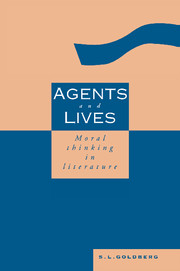Book contents
- Frontmatter
- Contents
- Acknowledgments
- Preface
- 1 ‘Perpetually moralists’ … ‘in a large sense’
- 2 ‘How to live’ and ‘how to live’
- 3 Agents and lives: making moral sense of people
- 4 ‘Doing good to others’: some reflections on Daniel Deronda
- 5 Moral thinking in The Mill on the Floss
- 6 Finding congenial matter: Pope and the art of life
- 7 Literary judgment: making moral sense of poems
- 8 Afterword: some limits of philosophy?
- Notes
- Index
8 - Afterword: some limits of philosophy?
Published online by Cambridge University Press: 19 January 2010
- Frontmatter
- Contents
- Acknowledgments
- Preface
- 1 ‘Perpetually moralists’ … ‘in a large sense’
- 2 ‘How to live’ and ‘how to live’
- 3 Agents and lives: making moral sense of people
- 4 ‘Doing good to others’: some reflections on Daniel Deronda
- 5 Moral thinking in The Mill on the Floss
- 6 Finding congenial matter: Pope and the art of life
- 7 Literary judgment: making moral sense of poems
- 8 Afterword: some limits of philosophy?
- Notes
- Index
Summary
It must be obvious that my argument all through this book owes a great deal to Iris Murdoch's The Sovereignty of Good – a book which so deepened my understanding of the moral aspects of literature that my debts to it are now much too basic and too pervasive to be spelt out in detail. But it must also be obvious that some of the particular points in my argument are very like views expressed by other recent English and American moral philosophers: Cora Diamond, Mary Mothersill, Richard Rorty, Stuart Hampshire, Bernard Williams, Alasdair Maclntyre and Martha Nussbaum, to mention only a few. Most of these also give literature an important place in ethics – so important, in fact, that taken together they provide a ‘humanist’ critic with a body of theory sufficient to explain and support a focus on the moral dimensions of literature. But while the critic is right to look to them, they supply explanation and support only up to a point. If literature is a distinctive and irreplaceable kind of moral thinking, as I have argued, it is because there is (to recall Hume's observation) ‘a part of ethics left by nature to baffle all the pride of philosophy’. It seems to me significant that, however widely a philosopher conceives the scope of the ‘moral’, he or she tends to think primarily of the conductmoral, when it comes to discussing specific works of literature.
- Type
- Chapter
- Information
- Agents and Lives , pp. 253 - 307Publisher: Cambridge University PressPrint publication year: 1993



